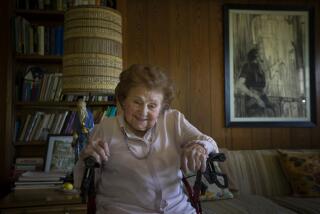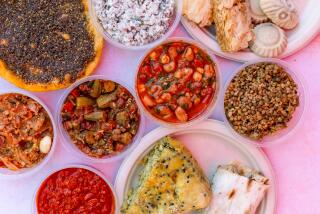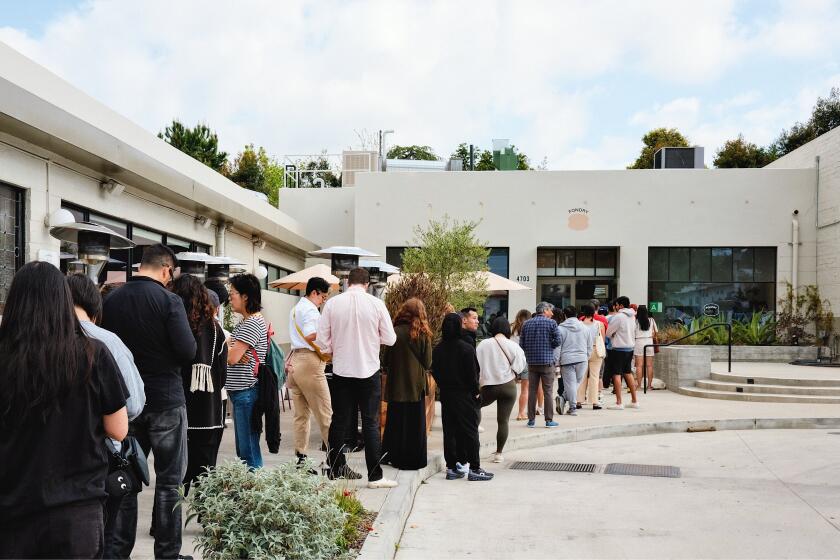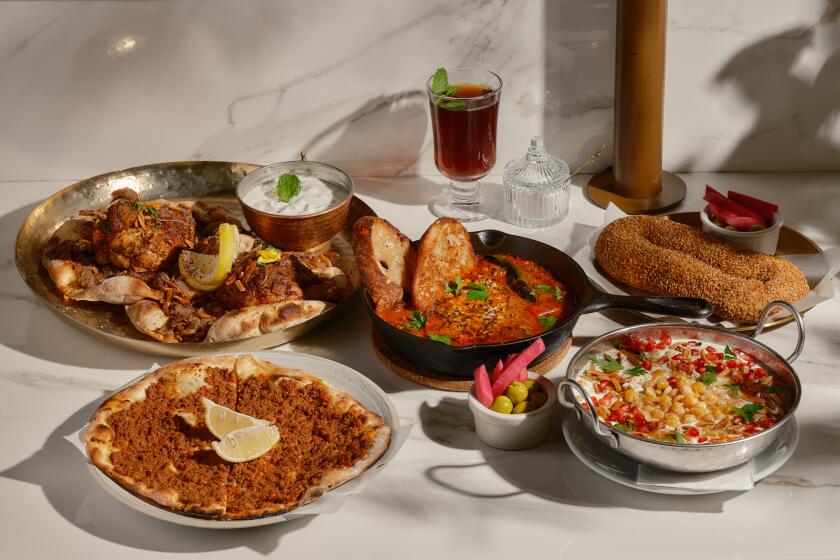“Kiwi Queen” Frieda Caplan turns 90
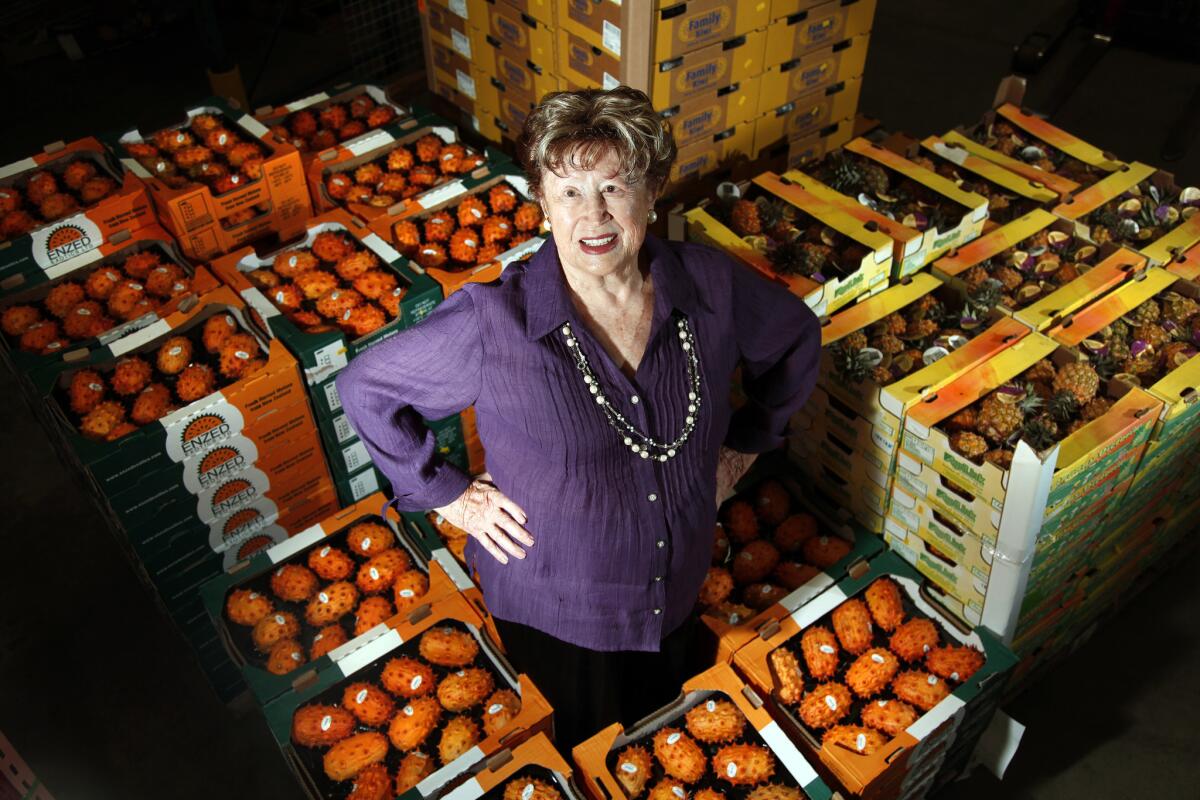
Many of the produce items at supermarkets today, such as kiwifruit, “champagne grapes,” and sugar snap peas, would have been utterly unfamiliar to shoppers half a century ago. Back then, most of the fruit and vegetables passed through wholesale terminal markets, which were completely dominated by men. Frieda Caplan, who revolutionized both of these fields in a long, legendary career as a specialty produce wholesaler, is celebrating her second 90th birthday today, only fitting for a woman who shattered so many conventions.
Frieda Rapoport was born either on Aug. 8 or 10, 1923, at White Memorial Medical Center in downtown Los Angeles. (Her birth certificate specifies Aug. 10, but her parents always told her that she was born Aug. 8, she says.) Her parents were recent immigrants from Russia, and her father, Solomon Rapoport, worked as a cutter and designer in women’s clothing factories, while her mother, Rose Yanowa, was a homemaker.
Frieda graduated from UCLA with a degree in political science in 1945, and started working in the office of a lawyer who was head of the CIO political action committee for Los Angeles, one of many liberal political involvements across her career. In 1951 she married Alfred Hale Caplan, president of a longshoremen’s union and a labor relations consultant.
Four years later she was working as a production manager for a nylon thread factory when she became pregnant, and looked for a job that would give her flexibility to take an extended leave to care for her child. She started working upstairs at the Seventh Street wholesale produce terminal in downtown Los Angeles, as a secretary for Giumarra Brothers Fruit Company’s stall, which was managed by her husband’s relatives.
One day when her husband’s uncle was on vacation, she filled in as a cashier downstairs on the selling floor, and started selling mushrooms, which were a minor sideline for the company. Women sales vendors were even rarer – she was the only one at the time – but with her promotion mushroom sales took off.
It was a tough business, but the men made an effort to clean up their language in her presence, she recalls.
“As long as they made money, they didn’t have a problem with me,” she says.
Word spread of her presence at the market, and on Nov. 10, 1961, the Los Angeles Times ran an article in its Family section about her. (“A sturdy brunet, mother of two, sets her alarm clock for 2 a.m. every weekday to enter a fascinating world known to very few.”)
Shortly afterwards a manager for the Southern Pacific Railroad, which ran the Seventh Street market, visited her and asked her to fill a vacancy as an independent vendor.
“I said, ‘That’s crazy, I don’t have any money or business management experience,’ ” she recalls.
But suppliers agreed to provide mushrooms on consignment, and on Apr. 2, 1962, her business, Produce Specialties, Inc., opened its doors. She was the first woman to own and operate a produce business at the market. The sign maker she hired happened to have a batch of purple and black paint handy, so those were the colors he used, and purple became Frieda’s signature hue.
At the time, other brokers focused on items sold in large volume, such as apples, lettuce, and potatoes. Since mushrooms were considered a small deal, when a farmer showed up at the market wanting to sell something even more unusual, such as shallots or alfalfa sprouts, they sent him (it was always a him in those days) to Frieda.
Her greatest fame came from her role in the commercialization of kiwifruit, which was native to China, grown on a small scale in New Zealand, and hardly known in the United States at the time. The way she tells it, in 1962 a customer of a Salt Lake City market who had recently visited New Zealand raved about “Chinese gooseberries,” as they were then called, to the produce manager. He contacted the Los Angeles wholesale market to see if such a fruit were available, but it wasn’t.
Frieda heard of this interest, and when an importer happened to offer the fuzzy fruit, she bought some, since she knew she had a customer. A friend told her that she would never succeed in selling something called Chinese gooseberries, so she promoted an alternative name suggested by a broker, kiwifruit, and the name stuck. Even so, it took 18 years, she recalls, for the fruit to become truly popular here.
“It was far from an overnight success story,” she says.
She also rebranded Zante currants, grown for centuries to make tiny raisins for baking, as “champagne” grapes, to be sold fresh.
Over time her company introduced many items that were previously unknown, or available only at small ethnic markets, to mainstream supermarkets, such as sugar snap peas, seedless watermelons, spaghetti squash, and habanero chiles.
Sometimes she was way ahead of her time: in 1970 she brought in mangosteen, a delicious but perishable tropical fruit, that only became a viable commodity in the past decade. She’s always had a special fondness for purple produce, and recently was tickled to introduce California-grown sweet potatoes with deep purple flesh.
Her company is now called Frieda’s, Inc. and located in Los Alamitos, near her home. Female executives now are common in the produce industry, so it’s no surprise that her elder daughter, Karen Caplan, is president, and a younger daughter, Jackie Caplan Wiggins, is vice president. Frieda, who is founder and chairman of the board, still comes to the office each day, and signs all the checks to produce suppliers.
Her gait has slowed, but her mind, her wit, and her enthusiasm for family, business and political affairs are as effervescent as ever.
ALSO:
Dinner in half an hour? Here’s three recipes
San Diego, pizza capital of the U.S. Seriously?
More to Read
Eat your way across L.A.
Get our weekly Tasting Notes newsletter for reviews, news and more.
You may occasionally receive promotional content from the Los Angeles Times.

